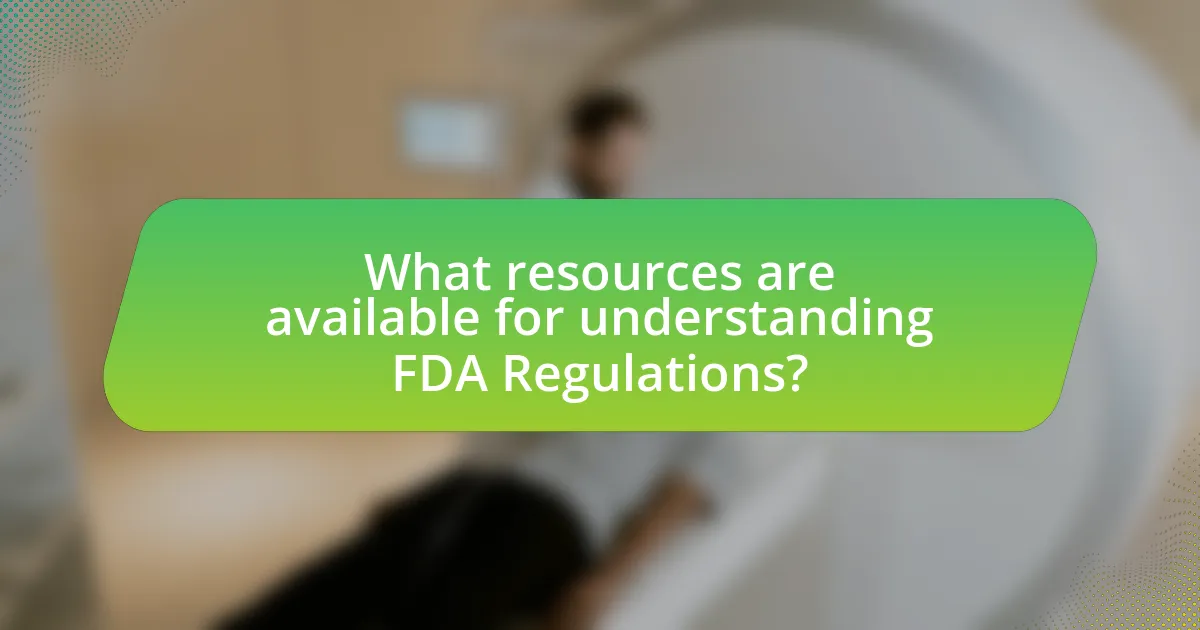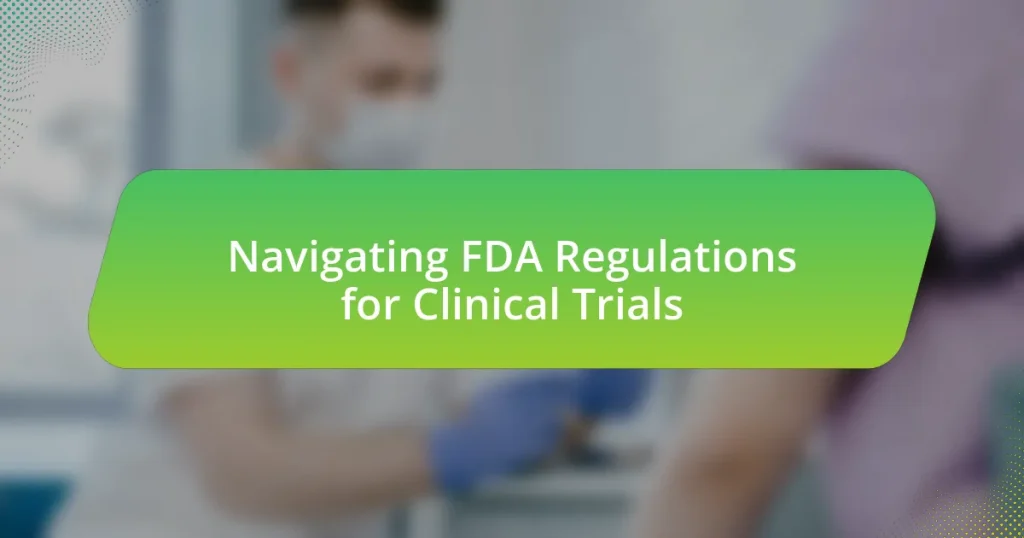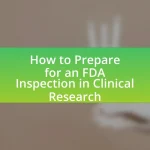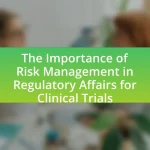FDA regulations for clinical trials are essential guidelines designed to ensure the safety, efficacy, and ethical conduct of research involving human subjects. These regulations, primarily outlined in Title 21 of the Code of Federal Regulations, mandate adherence to Good Clinical Practice standards, including informed consent, oversight by Institutional Review Boards, and accurate record-keeping. The article explores the importance of these regulations in protecting participant safety, maintaining data integrity, and facilitating the approval of new drugs and therapies. It also details the key components of FDA regulations, the phases of clinical trials, and the necessary steps for compliance, including the Investigational New Drug application process and the role of regulatory experts.

What are FDA Regulations for Clinical Trials?
FDA regulations for clinical trials are a set of guidelines established to ensure the safety, efficacy, and ethical conduct of clinical research involving human subjects. These regulations, primarily outlined in Title 21 of the Code of Federal Regulations (CFR), require that clinical trials adhere to Good Clinical Practice (GCP) standards, which include obtaining informed consent from participants, ensuring proper oversight by Institutional Review Boards (IRBs), and maintaining accurate and complete records of trial data. The FDA also mandates that sponsors submit an Investigational New Drug (IND) application before initiating clinical trials, which includes detailed information about the drug, its manufacturing, and the proposed study protocol. Compliance with these regulations is essential for the approval of new drugs and therapies, as they are designed to protect participants and ensure the integrity of the data collected during the trials.
Why are FDA Regulations important for clinical trials?
FDA regulations are important for clinical trials because they ensure the safety, efficacy, and ethical conduct of research involving human subjects. These regulations establish rigorous standards for trial design, conduct, and reporting, which help protect participants from harm and ensure that the data generated is reliable and valid. For instance, the FDA requires that clinical trials follow Good Clinical Practice (GCP) guidelines, which include informed consent processes and oversight by Institutional Review Boards (IRBs). This regulatory framework is crucial for maintaining public trust in the medical research process and for facilitating the approval of new therapies that meet established safety and effectiveness criteria.
What role do FDA Regulations play in ensuring participant safety?
FDA regulations play a crucial role in ensuring participant safety by establishing rigorous standards for the conduct of clinical trials. These regulations require that trials are designed to minimize risks to participants, ensuring that informed consent is obtained and that ethical considerations are prioritized. For instance, the FDA mandates that Institutional Review Boards (IRBs) review and approve study protocols to protect participant rights and welfare. Additionally, the FDA enforces Good Clinical Practice (GCP) guidelines, which outline the responsibilities of sponsors and investigators in safeguarding participant safety throughout the trial process. These measures collectively contribute to a structured framework that mitigates potential harm and enhances the integrity of clinical research.
How do FDA Regulations impact the integrity of clinical trial data?
FDA regulations significantly enhance the integrity of clinical trial data by establishing rigorous standards for data collection, reporting, and analysis. These regulations, such as Good Clinical Practice (GCP) guidelines, mandate that trials are conducted ethically and transparently, ensuring that data is reliable and reproducible. For instance, the FDA requires that all clinical trial data be subject to thorough auditing and monitoring, which helps to identify and mitigate any potential biases or inaccuracies in the data. Furthermore, adherence to these regulations is critical for the approval of new drugs and therapies, as the FDA evaluates the robustness of the data before granting market access. This systematic oversight ultimately fosters public trust in the safety and efficacy of medical products.
What are the key components of FDA Regulations?
The key components of FDA regulations include premarket approval, clinical trial oversight, labeling requirements, and post-market surveillance. Premarket approval ensures that new drugs and medical devices are safe and effective before they can be marketed, as mandated by the Federal Food, Drug, and Cosmetic Act. Clinical trial oversight involves adherence to Good Clinical Practice (GCP) guidelines, which protect the rights and welfare of trial participants. Labeling requirements dictate that products must provide accurate information regarding their use, risks, and benefits. Post-market surveillance involves monitoring products after they are on the market to identify any long-term effects or safety issues, ensuring ongoing compliance with safety standards. These components collectively ensure that FDA regulations maintain public health and safety.
What is the purpose of the Investigational New Drug (IND) application?
The purpose of the Investigational New Drug (IND) application is to obtain FDA approval to begin clinical trials of a new drug in humans. This application ensures that the drug’s safety and efficacy are evaluated before it can be tested in a clinical setting. The IND submission includes data from preclinical studies, manufacturing information, and a proposed clinical trial protocol, which collectively demonstrate that the drug is reasonably safe for initial testing in humans.
How does the Institutional Review Board (IRB) fit into FDA Regulations?
The Institutional Review Board (IRB) is integral to FDA regulations as it ensures the protection of human subjects involved in clinical trials. Under FDA regulations, specifically 21 CFR Part 56, an IRB must review and approve research protocols to confirm that risks to participants are minimized and are reasonable in relation to anticipated benefits. This regulatory framework mandates that any clinical trial involving human subjects must receive IRB approval before initiation, thereby reinforcing ethical standards and compliance with federal guidelines.
What are the phases of clinical trials as per FDA Regulations?
The phases of clinical trials as per FDA regulations are divided into four main stages: Phase 1, Phase 2, Phase 3, and Phase 4. Phase 1 focuses on safety and dosage, involving a small group of healthy volunteers to assess the drug’s safety profile. Phase 2 expands the study to a larger group of participants to evaluate efficacy and further assess safety. Phase 3 involves an even larger population to confirm effectiveness, monitor side effects, and compare the new treatment to standard or equivalent treatments. Finally, Phase 4 occurs after the drug is approved, focusing on post-marketing surveillance to gather additional information on the drug’s risks, benefits, and optimal use. These phases are essential for ensuring that new drugs are safe and effective before they reach the market.
What distinguishes Phase I, II, III, and IV trials?
Phase I, II, III, and IV trials are distinguished by their objectives, participant numbers, and stages of drug development. Phase I trials primarily focus on assessing the safety and tolerability of a drug in a small group of healthy volunteers, typically involving 20 to 100 participants. Phase II trials expand the participant pool to 100 to 300 individuals to evaluate the drug’s efficacy and further assess its safety. Phase III trials involve larger populations, usually 1,000 to 3,000 participants, to confirm efficacy, monitor side effects, and compare the drug to standard treatments. Finally, Phase IV trials occur post-marketing to gather additional information on the drug’s risks, benefits, and optimal use in the general population. This structured progression ensures thorough evaluation at each stage, aligning with FDA regulations for clinical trials.
How do FDA Regulations guide the transition between trial phases?
FDA regulations guide the transition between trial phases by establishing specific criteria that must be met for a clinical trial to progress from one phase to the next. These regulations require that data from earlier phases demonstrate sufficient safety and efficacy to justify moving forward. For instance, before advancing from Phase 1 to Phase 2, the FDA mandates that the trial sponsor submit an Investigational New Drug (IND) application, which includes safety data and a proposed plan for the next phase. Additionally, the FDA reviews the results of Phase 2 trials to ensure that the treatment shows promise before allowing progression to Phase 3, where larger populations are tested. This structured approach ensures that each phase builds on the previous one, minimizing risks to participants and optimizing the development process.

How do you navigate the FDA Regulations for clinical trials?
To navigate the FDA regulations for clinical trials, one must thoroughly understand the relevant guidelines and requirements set forth by the FDA. This includes familiarizing oneself with the Code of Federal Regulations (CFR), particularly Title 21, which outlines the regulations for drugs, biologics, and medical devices. Compliance with Good Clinical Practice (GCP) standards is essential, as these guidelines ensure the integrity of data and the protection of human subjects.
Additionally, submitting an Investigational New Drug (IND) application is a critical step for drug trials, which requires detailed information about the trial’s design, methodology, and safety data. Engaging with the FDA through pre-IND meetings can provide valuable feedback and clarify regulatory expectations.
Moreover, maintaining accurate documentation and adhering to reporting requirements, such as adverse event reporting, is vital for compliance. The FDA also mandates regular inspections of clinical trial sites to ensure adherence to regulations. Understanding these components and actively engaging with the FDA throughout the trial process is crucial for successful navigation of FDA regulations.
What steps should be taken to ensure compliance with FDA Regulations?
To ensure compliance with FDA regulations, organizations must implement a systematic approach that includes understanding applicable regulations, conducting thorough training, maintaining accurate documentation, and establishing robust quality control processes. First, organizations should familiarize themselves with relevant FDA regulations, such as the Code of Federal Regulations Title 21, which outlines requirements for clinical trials. Next, comprehensive training programs for staff involved in clinical trials are essential to ensure that they understand regulatory requirements and ethical considerations. Accurate documentation of all trial-related activities, including informed consent, adverse events, and data management, is crucial for demonstrating compliance during FDA inspections. Finally, organizations should establish quality control processes, including regular audits and monitoring, to identify and rectify any compliance issues proactively. These steps collectively help ensure adherence to FDA regulations and promote the integrity of clinical trials.
How can researchers prepare for the IND application process?
Researchers can prepare for the IND application process by thoroughly understanding FDA regulations and compiling necessary documentation. This includes conducting preclinical studies to establish safety and efficacy, developing a comprehensive clinical trial protocol, and ensuring compliance with Good Laboratory Practices (GLP). Additionally, researchers should engage in early communication with the FDA through pre-IND meetings to clarify expectations and requirements. According to the FDA’s guidance documents, a well-prepared IND application significantly increases the likelihood of approval, as it demonstrates the researcher’s commitment to regulatory standards and patient safety.
What documentation is required for FDA submissions?
FDA submissions require several key documents, including an Investigational New Drug (IND) application, which outlines the drug’s composition, manufacturing, and proposed clinical study protocols. Additionally, sponsors must provide a detailed clinical study report, informed consent documents, and safety reports. The IND application must also include preclinical data, pharmacology, toxicology studies, and a plan for monitoring the safety of participants. These documents ensure compliance with FDA regulations and facilitate the review process, as mandated by the Federal Food, Drug, and Cosmetic Act.
What common challenges do researchers face in navigating FDA Regulations?
Researchers commonly face challenges such as understanding complex regulatory requirements, maintaining compliance with evolving guidelines, and managing the lengthy approval processes associated with FDA regulations. The FDA’s regulations are intricate and often require specialized knowledge, which can lead to confusion and misinterpretation. Additionally, the regulatory landscape is subject to change, necessitating continuous education and adaptation by researchers to ensure compliance. The approval process can be time-consuming, delaying the initiation of clinical trials and impacting research timelines. These challenges are well-documented in literature, highlighting the need for effective training and resources to support researchers in navigating FDA regulations successfully.
How can researchers address delays in the approval process?
Researchers can address delays in the approval process by streamlining communication with regulatory agencies and ensuring comprehensive documentation. Effective communication helps clarify requirements and expectations, reducing misunderstandings that can lead to delays. Comprehensive documentation, including detailed study protocols and data management plans, minimizes the need for additional information requests from the FDA, which can prolong the approval timeline. Studies have shown that proactive engagement with the FDA during the pre-submission phase can significantly decrease review times, as evidenced by the FDA’s own reports indicating that early dialogue can lead to more efficient evaluations.
What are the consequences of non-compliance with FDA Regulations?
Non-compliance with FDA regulations can result in severe consequences, including legal actions, financial penalties, and the potential for product recalls. The FDA has the authority to impose civil and criminal penalties on organizations that fail to adhere to its regulations, which can include fines that reach millions of dollars. Additionally, non-compliance may lead to the suspension or revocation of product approvals, hindering market access and damaging a company’s reputation. Historical data shows that companies facing FDA enforcement actions often experience significant drops in stock prices and loss of consumer trust, further illustrating the critical importance of regulatory compliance in clinical trials.

What resources are available for understanding FDA Regulations?
The primary resources available for understanding FDA regulations include the FDA’s official website, guidance documents, and the Code of Federal Regulations (CFR). The FDA’s website provides comprehensive information on regulatory processes, including detailed sections on drug and device approvals, labeling requirements, and clinical trial regulations. Guidance documents offer insights into the FDA’s current thinking on specific topics, helping stakeholders align their practices with regulatory expectations. The CFR, particularly Title 21, contains the legal framework governing food and drugs, providing the specific regulatory language and requirements that must be adhered to. These resources collectively serve as essential tools for navigating the complexities of FDA regulations in clinical trials.
Where can researchers find official FDA guidance documents?
Researchers can find official FDA guidance documents on the FDA’s website, specifically in the Guidance Documents section. This section provides access to a comprehensive collection of documents that outline the FDA’s current thinking on various topics related to clinical trials and other regulatory matters. The FDA regularly updates these documents to reflect new scientific knowledge and regulatory practices, ensuring that researchers have access to the most current information.
What role do professional organizations play in providing support?
Professional organizations play a crucial role in providing support by offering resources, guidance, and advocacy for individuals navigating FDA regulations for clinical trials. These organizations often provide educational materials, training programs, and networking opportunities that help professionals understand complex regulatory requirements. For instance, the Association of Clinical Research Organizations (ACRO) offers resources that clarify FDA guidelines, enabling members to stay compliant and informed. Additionally, professional organizations advocate for their members’ interests, influencing policy decisions that affect clinical trial processes, thereby enhancing the overall efficiency and effectiveness of research activities.
What best practices can help in navigating FDA Regulations effectively?
To navigate FDA regulations effectively, organizations should implement a comprehensive compliance strategy that includes thorough understanding of applicable regulations, continuous training for staff, and proactive communication with the FDA. A detailed knowledge of the FDA’s guidelines, such as the Code of Federal Regulations Title 21, is essential for ensuring compliance in clinical trials. Continuous training ensures that all team members are updated on regulatory changes and best practices, which is critical given the dynamic nature of FDA regulations. Proactive communication with the FDA, including pre-submission meetings and ongoing dialogue, can clarify expectations and reduce the risk of non-compliance. These practices collectively enhance the likelihood of successful navigation through the regulatory landscape.
How can collaboration with regulatory experts enhance compliance?
Collaboration with regulatory experts enhances compliance by ensuring that organizations accurately interpret and implement FDA regulations. Regulatory experts possess specialized knowledge of the complex legal and procedural requirements governing clinical trials, which helps organizations avoid costly missteps. For instance, a study published in the Journal of Clinical Research found that companies engaging regulatory consultants experienced a 30% reduction in compliance-related delays during trial phases. This collaboration facilitates proactive identification of potential compliance issues, streamlining the approval process and ultimately leading to more successful trial outcomes.
What strategies can be employed to stay updated on regulatory changes?
To stay updated on regulatory changes, professionals should regularly monitor official sources such as the FDA website, subscribe to industry newsletters, and participate in relevant webinars and conferences. The FDA frequently updates its guidelines and regulations, making its website a primary resource for accurate information. Industry newsletters often summarize key changes and provide insights into implications for clinical trials. Additionally, attending webinars and conferences allows professionals to engage with experts and gain firsthand knowledge of upcoming regulatory shifts. These strategies ensure that individuals remain informed and compliant with evolving regulations in clinical trials.






